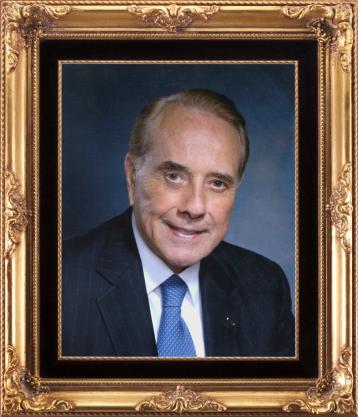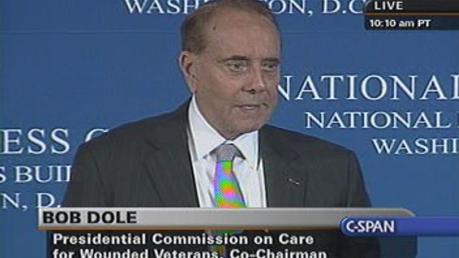Appreciation: Sen. Bob Dole, a free press defender, spoke often at the Club
As congressional leaders begin to arrive on Capitol Hill to pay respects to the late Sen. Bob Dole, whose casket will lie in state in the Capitol Rotunda Thursday, Dec. 9, some Press Club members are recalling their time covering his Senate years and his relationship with reporters and the media in general. Dole died Sunday, Dec. 5, in Washington at the age of 98.

Sen. Bob Dole, R-Kan., was a friend of the press in general and the National Press Club in particular. Like his GOP and World War II contemporary, Gerald Ford, Dole believed a free press was essential to a free country. He engaged with the press to compete in the arena of political ideas and made numerous appearances at the Club.
Dole had a wry sense of humor that mellowed with age.* While open with the press, he could be curt with reporters, as he was with me when I reached him by phone for a prediction on pending legislation. "I'm not going to spend a lot of time on this," he told me of our impending interview. Nevertheless, he gave me what I needed.
As a member of the Club's Speaker's Committee, I arranged what may have been Dole's last luncheon speech at the Club scheduled close to a Veterans Day. Like my oldest brother, he was a decorated combat veteran of World War II in Europe and we chatted prior to his speech about how the challenges of civilian life seemed inconsequential compared to their wartime experiences.
Dole had just published his 2005 biography, "One Soldier's Story," in which he chronicled his difficult emotional and physical recovery from the combat wounds he suffered in Italy. I asked Dole if he would inscribe a copy of the book to a friend who was going through a difficult time. I felt a bit guilty asking when I saw how difficult it was for him to write with his war-damaged arm. But he graciously agreed and his effort made the inscription doubly inspiring.
Dole, by then retired from the Senate, did not talk about press issues at his Sept. 3, 2005, Club luncheon speech marking the 60th anniversary of the ending of World War II (Sept. 2, 1945). But during the interview period after his May 23, 2008, speech in the Club ballroom, then-NPC President Sylvia Smith asked him about the time several years earlier when he, from that very podium, closed his remarks by reading a note from his friend, journalist Judith Miller, who was at that time sitting in jail rather than disclose her anonymous source. "You read her plea for a federal shield law. It's three years later and there's still no shield law. What will it take, and have you encouraged your former congressional colleagues to support it?" Smith asked. Dole responded: "I thought a federal shield law was appropriate and still do. And I think it's being ... debated," acknowledging there was also opposition to it. Miller, who was working at The New York Times, spent about 85 days incarcerated rather than reveal her confidential source during a federal grand jury investigation of the "outing" of CIA operative Valerie Plame.
about the time several years earlier when he, from that very podium, closed his remarks by reading a note from his friend, journalist Judith Miller, who was at that time sitting in jail rather than disclose her anonymous source. "You read her plea for a federal shield law. It's three years later and there's still no shield law. What will it take, and have you encouraged your former congressional colleagues to support it?" Smith asked. Dole responded: "I thought a federal shield law was appropriate and still do. And I think it's being ... debated," acknowledging there was also opposition to it. Miller, who was working at The New York Times, spent about 85 days incarcerated rather than reveal her confidential source during a federal grand jury investigation of the "outing" of CIA operative Valerie Plame.
Dole said that he "always had a pretty good rapport with the media" even though most reporters were liberal, and that he did not think he was treated even-handedly in his presidential contest against Bill Clinton.
Some years ago, while traveling through Kansas, I drove through Dole's hometown of Russell. He credited the townspeople with making possible his post-war recovery and starting his political career. The town's prominent grain elevator proclaimed "Home of Bob Dole." The letters were fading but the pride was still there.
* Editor's note: At Ken Dalecki's suggestion, we asked former NPC President Richard Sammon (1997) about his years covering Dole for Congressional Quarterly. He described a scene in the Senate one day during those years: "I was working for CQ as their senior Senate floor reporter through the 1990s. All day and often night. Sen. Joe Biden was speaking one Tuesday at enormous length on the floor about something or other. Bob Dole, the majority leader, asked to be recognized for a question. 'I’d like to know how long the senator from Delaware will be speaking, as I have a flight to catch on Thursday.' Biden, who was known for long speeches, barely chuckled at Dole’s little dig. 'As much time as I consume,' Biden said. Dole didn’t get the answer he wanted but the point was made. The chamber was otherwise empty."
Biden, who is now president, called Dole "a statesman like few in our history" upon his death, and ordered the U.S. flag to be flown at half-staff at the White House and on public property.
This link is to Dole’s Senate farewell speech in 1996, the year he ran in the presidential election, in which he specifically thanks reporters for their contributions to the life of the Senate and to democracy.
